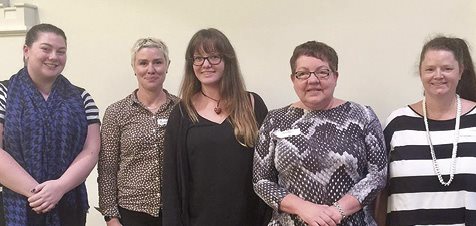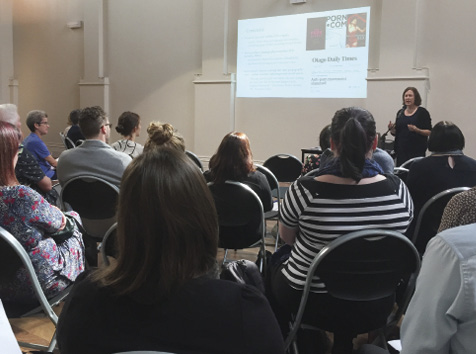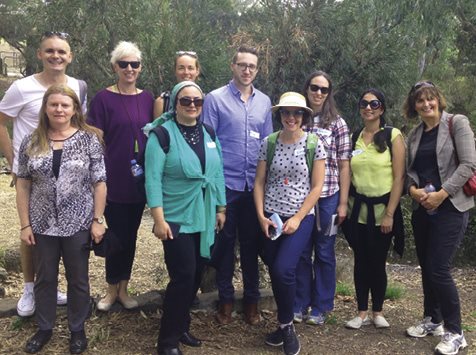The 13th Trans-Tasman Community Psychology College Conference in Melbourne was one of the biggest ever, with more than 80 delegates including colleagues from Aotearoa New Zealand, South Africa, Indonesia and Bhutan attending across three days in April. The event was co-hosted by the APS College of Community Psychologists and Victoria University in collaboration with the Institute of Community Psychology Aotearoa and APA Division 27 – The Society for Community Research and Action, and took place in the beautiful surrounds of the Uniting Church Centre for Theology and Ministry in Parkville.

The conference kicked-off informally with an agency bus tour that provided a group of delegates with an opportunity to visit a range of community agencies in Melbourne and experience first-hand some important local institutions that exemplify community psychology principles. Agencies visited included the Victorian Cooperative on Children's Services for Ethnic Groups (VICSEG) New Futures, the Centre for Education and Research in Environmental Strategies (CERES) Community Environment Park, and the Smith Street Women’s Mural. Delegates also visited the Koori Heritage Trust in Federation Square, and participated in the Birrarung Wilam cultural walk to learn more about Melbourne’s Aboriginal history and of sites and events of local significance for Indigenous people.
A welcome reception at Victoria University’s city campus featured an invited address by Associate Professor Christopher Sonn who shared his thoughts about the status of community psychology both inside and outside the university context. Chris expressed his concern that community psychology lives precariously in university spaces, seemingly always having to fend for its survival. Drawing on his community-based arts projects, he challenged the audience to assess the value of such initiatives, which he feels have created spaces committed to being interdisciplinary, and which support the survival of community psychology, and reduce the gap between the university and the community.
Critical conversations
The specific focus of the conference was to revisit the critical foundations of community psychology to promote critical reflexivity and identify opportunities for change. The theme of ‘critical conversations’ played on the definitions of the term ‘critical’ in that the issues discussed are urgent (time critical) as well as critical in the sense of being considered through an alternative lens.
Presentations covered a diverse array of topics with delegates not afraid to tackle difficult issues. Topics included Indigenous sovereignty and social and emotional wellbeing, lived experiences of mental health, disability, gender and safety, working with marginalised young people, climate change, gender identity, tertiary education curricula, and the social determinants of health. A highlight was the live presentation of a South Sudanese youth-led community arts project.
Keynotes
Delegates were treated to an informative and engaging Welcome to Country by Wurundjeri elder Bill Nicholson. He spoke about his people as one of the clans of the Kulin Nation of the Woiwurrung language groups who have walked the ground upon which the conference was held for more than 40,000 years. Bill stressed that his people might not hold us responsible for past wrongs but they will definitely be holding us accountable for the future. This was followed by Professor Dennis McDermott’s keynote address, Having the Hard Conversations: Critical thinking, psychological praxis and Indigenous mental health and wellbeing.
Dennis painted an alarming picture of the state of wellbeing in Indigenous communities, noting that rates of Aboriginal and Torres Strait Islander mental distress are almost three times those of non-Indigenous Australians. Providing more effective services to Indigenous communities is an urgent imperative. The development of a mental health workforce with a nuanced grasp of the social determinants of Indigenous health, able to provide culturally-safe care in supportive, welcoming settings, and premised on more holistic models of service delivery, is central to better outcomes. The presentation drew on outcomes of a National Senior Teaching Fellowship, a collaboration with colleagues in Canada and Aotearoa New Zealand, which set out to generate strategies for ‘having the hard conversations’ necessary for change.
The need for critical conversations around pornography was highlighted in Professor Nicola Gavey’s Saturday keynote. Nicola talked about a social action project in Auckland designed to create spaces for new conversations about the ethics and politics of porn via art projects, workshops with young people, various forms of social engagement and short videos. Nicola highlighted the importance of situating discussions about pornography alongside wider cultural and gender politics, and of focusing critical attention on the sexism, misogyny and racism within and around it.
Concluding remarks
In among the stimulating presentations, delegates were also treated to an exhibition of images from Motherhood Unmasked, a community arts project critically reflecting on the role of mothers in society and how mothering is valued more generally. Also launched was the free ebook, Working with huge couches: What do community psychologists actually do?, which was produced by Peter Streker, Kate Lucas and Fletcher Curnow (download the book at communitystars.com.au/resources).
While the program had something for everyone, it was the presence of so many like-minded people that was the standout, with one delegate in particular remarking that she had ‘found her people’. At the closing plenary, conference chair Heather Gridley was dubbed the ‘Aunty of Community Psychology’, but perhaps the most heartwarming aspect was the wide representation of community psychologists and fellow travellers, past, present and emerging. It is through establishing, maintaining and building these connections that we are able to continue practising what we preach.
More information about community psychology
Conference program and presentations.
Look out later this year for the special edition of The Australian Community Psychologist with the conference proceedings and papers
Conference Chair Heather Gridley (second from right) with student volunteers from the Victoria University community psychology program.

Keynote speaker Nicola Gavey.

Conference bus-tour group.
